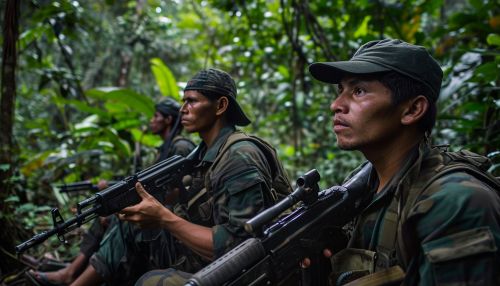Revolutionary Armed Forces of Colombia
Background
The Revolutionary Armed Forces of Colombia (FARC) is a Marxist-Leninist guerrilla group established in 1964. The group was formed as a military wing of the Colombian Communist Party and was influenced by the ideologies of Karl Marx, Friedrich Engels, and Vladimir Lenin. The group's main objective was to overthrow the Colombian government and replace it with a socialist state.
Formation and Early Years
The FARC was established during a period known as "La Violencia," a ten-year civil war between the Liberal Party and the Conservative Party that resulted in the deaths of over 200,000 people. The FARC was initially a self-defense group of communist farmers who banded together to protect themselves from the violence. The group was led by Manuel Marulanda, a communist party member and farmer who became the group's military leader.


Ideology
The FARC's ideology is rooted in Marxism-Leninism, a form of socialist thought that advocates for the overthrow of capitalist systems and the establishment of a proletarian state. The group also adheres to the principles of Bolivarianism, a political doctrine that advocates for Latin American unity and independence from foreign influence. The FARC views the Colombian government as a puppet of the United States and believes that only a socialist revolution can free Colombia from foreign domination.
Military Structure and Operations
The FARC operates as a hierarchical military organization with a central command structure. The group is divided into several fronts, each responsible for a specific geographical area. These fronts are further divided into columns and companies, each with its own commander. The FARC's military operations include guerrilla warfare, bombings, assassinations, and kidnappings. The group has also been involved in drug trafficking to fund its operations.
Peace Process and Disarmament
In 2012, the Colombian government and the FARC began peace negotiations in Havana, Cuba. After four years of negotiations, a peace agreement was signed in 2016. The agreement included provisions for the FARC's disarmament, political participation, and reparations for victims of the conflict. Despite some opposition, the peace agreement was ratified by the Colombian Congress and the FARC officially disbanded in 2017.
Legacy
The FARC's legacy in Colombia is complex. While the group's disarmament has brought an end to over five decades of conflict, the peace process has been fraught with challenges. Many former FARC members have struggled to reintegrate into society and there has been a rise in violence in areas previously controlled by the FARC. The group's involvement in drug trafficking has also had a lasting impact on Colombia's illicit drug trade.
